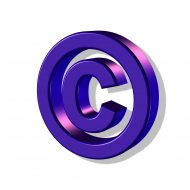 There is a lot of confusion in the business world about copyright and trademark. Many people use them interchangeably or call a trademark a copyright and vice versa. The reality is that trademark and copyright are two separate and distinct animals with little overlap. While the two are very different, the good news is that the differences are easily defined and when applied in the business world, make a great deal of sense. The differences are most notable in the areas of the content that are protected and the duration of that protection.
There is a lot of confusion in the business world about copyright and trademark. Many people use them interchangeably or call a trademark a copyright and vice versa. The reality is that trademark and copyright are two separate and distinct animals with little overlap. While the two are very different, the good news is that the differences are easily defined and when applied in the business world, make a great deal of sense. The differences are most notable in the areas of the content that are protected and the duration of that protection.
Content: Each protects different things
Perhaps the most fundamental difference between trademark and copyright is what each protects.[1] A trademark is a word(s), symbol(s), phrase(s), color, or even sound that, when affixed to a product or the rendering of a service, is used to sell that product or service. Famous trademarks include the Nike swoosh for footwear, the color pink for insulation, and the distinctive Coca-Cola curved bottle for drinks. Trademarks serve an important purpose which is to allow purchasers to instantly identify the source of the product (hence trade and mark). The ability to distinguish the source of a product or service from competitors is the raison d’etre for trademarks. When a mark fails to meet this fundamental threshold, it does not qualify as a mark.
A copyright, on the other hand, is a Constitutional right that allows authors to have the sole right to exploit their original works for a limited period of time. In other words, it allows writers, photographers, artists, architects, businesses, musicians, composers, and many others to protect their artistic works – and that term is used loosely – from others being able to copy them or use them for gain, but for a limited time. Probably the most famous copyright around still belongs to Disney for its animated steamboat-driving, tuxedo-clad mouse. The bar for originality, however, is fairly low. You do not need to be Disney nor do you need to have exceptional artistic ability. Your selfies on your phone very well may qualify.
Duration: One is absolute and one can be infinite.
Copyright protection for authors is enshrined in the Constitution, but only for a limited time.[2] “Limited” started out very limited indeed, but has been progressively extended over the years. The copyright in a work created today can, under the right conditions, last more than a century. That’s because currently, the term of copyright is the life of the author plus 70 years or 120 years from the date of creation, whichever comes first. It is very possible then for a work to have a copyright-lifetime of over a century. Mickey Mouse is nearing this mark and still going strong.
Trademark protection, on the other hand, is theoretically timeless as there is no limit on the number of ten-year terms a registration can be renewed.[3] Unlike copyright, it is not in the Constitution and thus has no prescribed limit. The reality, however, is that trademarks get their life from use and failure to use a mark will kill the mark. Thus, many marks are discontinued after 10, 20, or more years due to the item no longer being sold. A special subset of marks die because they cross the line into being generic, meaning they cannot function any longer as a source indicator. Escalator, aspirin, and zipper are a few examples that were once trademarks but are now everyday words in our lexicon. Some marks, however, like the Coca-Cola bottle, survive the duration. The bottle’s registration recently celebrated its centennial.
Trademark and copyright can be daunting and unknown, but it is a vital asset of any business. For this reason, you should consider contacting Muir & Associates to evaluate your trademarks and copyrights for protection. Our attorneys can help you understand your assets and how to maintain their protection.
Other articles:

